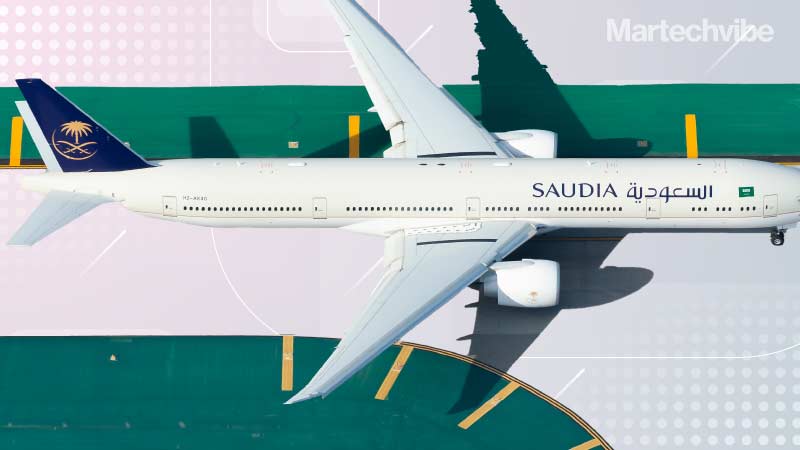Martech Spotlight: Saudia
Saudi Arabia’s national flag carrier is all set to leverage artificial intelligence and emerging technologies to boost customer experiences in sophisticated and meaningful ways As Saudi Arabia looks to create an AI-powered, date-driven economy by applying cutting-edge AI solutions diversified across sectors, air transport is set to benefit from these plans greatly. In September 2022, […]
Topics

Saudi Arabia’s national flag carrier is all set to leverage artificial intelligence and emerging technologies to boost customer experiences in sophisticated and meaningful ways
As Saudi Arabia looks to create an AI-powered, date-driven economy by applying cutting-edge AI solutions diversified across sectors, air transport is set to benefit from these plans greatly.
In September 2022, at the Global AI Summit in Riyadh, Saudi Arabian Airlines, also known as Saudia, signed a memorandum of understanding (MoU) with the Saudi Data and Artificial Intelligence Authority and the Saudi Company for Artificial Intelligence (SDAIA).
The aim is to create and sustain a joint framework to utilise the latest AI and emerging technologies to enhance customer experiences and explore ways and means to develop and deploy AI applications. All three parties have also agreed to leverage advanced technology and natural language processing across Saudia’s customer care and digital channels.
This comes as part of Saudia’s long-term vision to strengthen customer experiences via a digital-first model, working with emerging technologies, AI and the Internet of Things.
Among their strategic targets is SauTech, a voice-to-text system and a highly sophisticated speech recognition solution to improve customer care applications.
History
Starting in 1945 as Saudi Arabian Airlines, Saudia kicked off with a single twin-engine DC-3 (Dakota) HZ-AAX gifted to King Abdul Aziz by the then US President Franklin D. Roosevelt. Months later came the purchase of two more DC-3s, forming the core of what would become one of the world’s largest airlines. Today, Saudia has 142 aircraft operating in over 90 cities across Asia, Europe, Africa and North America from its hubs of Jeddah, Riyadh, Dammam, Medina and Abha.
New Technology To Improve Loyalty Program
In 2020, Saudia signed a ten-year contract with Comarch, a global provider of software-defined products and services for improving business efficiency. The airline had been on the lookout for a new technology provider since 2018, aiming to carry out an extensive transformation of its Alfursan Loyalty Program.
The aim was to implement a loyalty management system for the Travel edition of Comarch Loyalty Management (CLM 5). Aiming to focus on innovation and technology at every step of the customer experience, Saudia planned to push the limits of traditional loyalty management programs and integrate the latest customer engagement techniques to build stronger, more personal relationships with clients.
CLM for Travel is explicitly designed for travel industry professionals such as Saudia, which means improved customer engagement, gaining a competitive advantage, and reducing operational costs.
Being a constantly evolving software, CLM’s add-on features, such as location-based services and gamification, could play a major role in keeping Saudia on the cutting edge of new technology.
At present, the loyalty program has three tiers – Blue, Silver Elite and Gold Elite Plus, offering benefits such as rapid check-in, lounge access, priority boarding and rewards miles.
Incorporating SAP For Best Practices
Saudia is no stranger to incorporating relevant technology for more efficient and effective operations. In 2011, as the Middle East became a hub for business and leisure tourism, Saudia, then operating a fleet of 139 aircraft, realised the importance of investing in intelligent technology to sustain and expand its business, aligning with the travel momentum in the region. At the time, the airline announced the successful implementation of the SAP Enterprise Resource Planning (ERP) business solutions software to ensure best practices across the organisation.
Saudia needed a unified business and IT infrastructure to drive the transformation of its operations into nine multiple subsidiaries: Saudia Airlines, Saudia Catering, Saudia Cargo, Saudia Ground Services, Saudia Medical Services, Saudi Aerospace & Engineering Industry, Prince Sultan Aviation Academy, Saudia Real-estate Development Company, and Saudia Holding.
Even back then, Saudia recognised that it needed to apply technology if it were to gain a competitive advantage and also adapt to emerging technology and CX trends. SAP ERP provided it with the business solutions software to streamline back-office processes across the entire group and the necessary support/integration to front-line solutions. With this, Saudia could improve customer services and products, increase its revenue, reduce costs and enhance both efficiency and productivity.
Tailored specifically to fit Saudia’s needs, the SAP ERP application was the backbone of the essential functions of business processes and operations. The implementation was part of an overall strategic plan aimed at facilitating the airline’s privatisation strategies and reacting to market conditions.
The completed rollout saw improved overall productivity, simplified and integrated processes and enhanced customer relationship management.
Sustainability For Customer Engagement
In May 2022, Saudia was announced the winner of the customer engagement category in the SkyTeam Sustainable Flight Challenge. This honour came after Saudia ran the world’s first in-flight sustainability lab on a Jeddah to Madrid flight to crowd-source ideas from clients.
In partnership with Simplifying, the sustainability lab was run on 12 May onboard a Saudia 787-9 Dreamliner, which was also the world’s longest carbon net-positive flight. Guests on the flight were invited to submit their ideas on what constituted greener air travel—this included time spent on the flight, at the airport and the final arrival at their destination.
Conclusion
Saudia remains a force to be reckoned with in the field of air travel. As of 2018, the group owned 70 per cent of the market share in the region. However, competition is fierce and ever-present. It remains to be seen how the airline integrates technology and pursues continued excellence in customer service to stay relevant and maintain its market niche.
If you liked reading this, you might like our other stories
Martech Spotlight – Saudi Telecom Company (STC)
Martech Spotlight: Zain Saudi







